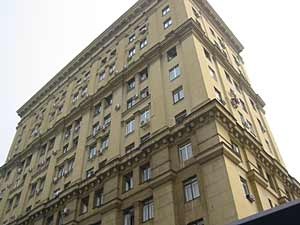Rosatom, Russia’s state nuclear corporation, expects to double its annual revenue from foreign projects to some $15 billion by 2024, Alexei Likhachev, the company’s director general said last week – up from $6.6 billion from overseas projects last year.
Rosatom, Russia’s state nuclear corporation, expects to double its annual revenue from foreign projects to some $15 billion by 2024, Alexei Likhachev, the company’s director general said last week – up from $6.6 billion from overseas projects last year.
Speaking in a meeting with Dmitry Medvedev, the prime minister, Likhachev said overseas projects were a “key theme” of the nuclear monopoly’s future development and would play a crucial role in weaning the corporation off the state funding it currently receives.
The announcement, which came in a government transcript of the meeting between the two officials, renews speculation about just how much business the corporation is doing abroad. Numerous experts have suggested that memorandums of understanding and other handshake-type agreements have inflated Rosatom’s foreign business portfolio for reactor builds that may not materialize.
In March, Ecodefense, a prominent Russian environmental group, detailed a number of cases where the corporation misstated the worth of its overseas reactor construction projects in publically available documents, including in annual reports and on its website.
In particular, the group singled out the 36 reactors Rosatom claims it is building abroad for a total value of $133 billion. After reviewing the corporation’s public statements, however, Ecodefense found that Rosatom had only $97 billion in outstanding foreign revenues, for a total of about 20 overseas reactor projects.
Shortfalls in foreign construction, Ecodefense warned, could mean that Rosatom would demand more government funding at a time when the corporation is supposed to taper off the state subsides that it has received for the past several decades.
But Likhachev spoke in more general terms during his meeting with Medvedev. According to his figures, Rosatom is experiencing record investments of some $250 billion. He also said the “open part” of the company’s revenues had for the first time exceeded $15.2 billion.
Presumably that “open part” of the revenues refer to contracts and orders that are not tied to Russia’s military complex, though that was not made explicit in the transcript of the meeting.
However Likhachev did specific that 50 percent of the company’s projected revenue was accounted for by new business consisted of orders from the nuclear weapons complex and other defense contracts.
Likhachev highlighted that Rosatom’s financial contributions have reached some $250 billion. That funding, he said, goes to social funds, local budgets and the federal budget. Rosatom’s wages are also on the rise, up 7 percent annually, which Likhachev said outpaced national averages. The company has also seen a 9 percent increase in labor productivity.
Additionally, said Likhachev, Rosatom added 11,000 high-tech jobs to the Russian economy over the past five years and plans to more than double that by 2024, for a total of 25,000 jobs.
The corporation also commissioned a number of domestic reactors over the past year, including the Rostov nuclear power plant’s number 4 unit, the number 1 unit of the Leningrad II nuclear plant, and the number 2 unit at the Novoronezh II nuclear plant.
It also brought the reactors aboard its floating nuclear plant, the Akademik Lomonosov, up to full capacity. Likhachev says he expects the floating plant’s operating license to be finalized by July, prior to its deployment in Kamchatka.
While there is reason to be skeptical of some of Rosatom’s towering income claims, the company will be overseeing the construction of infrastructure along the Arctic Northern Sea Route, a project so large that it accounts for a tenth of all of Russia’s economic investments.




